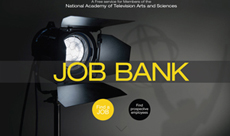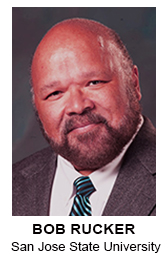Governor: 2021-2023 (replacing Troy Espera); 2023-2025
As a child, Bob Rucker would often prop up a blackboard in the basement of his family’s south side Chicago home to ‘teach’ a collection of his teddy bears before heading upstairs to watch, with his parents, the nightly newscast with Walter Cronkite. It comes as no surprise that, more than 40 years later, this distinguished professor emeritus of journalism and mass communications at San José State continues to welcome and facilitate conversations about news, diversity issues and inclusion concerns in Bay Area communities.
Rucker inherited his passion for journalism from his Georgia born mom and dad who placed great value on following and understanding current events. “They never finished high school, but they were very big on reading the newspaper and watching the news,” Bob recalls. “My mother always stressed the importance of knowing what’s going on in the world because it can be applied to whatever job you have.” That incentive came in handy in college, when Rucker was invited by a campus friend at Northern Illinois University to read the news on a Sunday morning radio show. As luck would have it, a journalism professor there heard him, called the station and invited Bob to try out for the student television news program. He auditioned, got the sports anchor job, and by the next semester was serving as program sports director for his ability to critically think and write conversational broadcast news copy quickly, without any academic training.
That opportunity redirected Bob Rucker’s goal as an undergraduate political science major and education minor. Instead of going to law school and eventually running for public office, a longtime dream, Bob asked that NIU professor to help him put together a resume reel for an entry level television news job. Rucker recalls mailing 300 letters to stations across America, but only six responded, and just one offered to fly him to Des Moines, Iowa for an interview. The news director was building a team of young aggressive journalists, out to prove themselves, who would change how the state capital was being covered on television. Jack Cafferty, his first news director at WHO‐TV gave Rucker “six months to learn how to shoot and edit film and report like a pro, or get out.” Bob made the most of it. In two months, Rucker was named weekend news coanchor, and the station’s beat reporter assigned to cover city hall and the local police.
Two years later, Cafferty moved to a new TV job in New York City, and he and his wife helped Bob quickly land a new position there as a national features producer for Newsweek magazine’s new broadcast service. After crisscrossing the country developing and reporting a wide range of stories, Rucker wanted to get back into local TV news. Eventually he secured a medical reporter’s job in Philadelphia, PA., and got the newsroom nickname ‘Dr. Bob.’ During his three years there, Rucker proved to be formidable at convincing doctors to talk with him candidly on camera, and allow him and his cameraman extraordinary access to patients and critical medical procedures.
Bob Rucker also served there as a weekend news anchor, and bureau chief for the station’s nearby New Jersey news operation. While at KYW‐TV3, Rucker said he was most proud of his nine days of reporting on health related stories and breaking news updates at the site of the Three Mile Island nuclear accident. Later in 1979, he asked to be part of special team coverage, met and conducted a live shot interview with Pope John Paul II during his first visit to America as pontiff.
Those experiences would catch the eye of producers for Ted Turner’s new, and some called “wacky adventure,” a 24‐hour cable television news service. Bob Rucker was hired to be the CNN national news correspondent based in San Francisco who travelled extensively covering earthquakes, volcano eruptions, headline murder trials and other top breaking news across the western United States. Despite a promising seven‐year career as a professional newsman, Rucker was forced to leave the industry suddenly at age 29 when he suffered a mild heart attack on the way to work one day.
Angry and disappointed, Bob called his mother who reminded him of those ‘blackboard teddies,’ and how he studied to be a teacher someday. Rucker did some quick research, and discovered a unique opportunity in his home state at the University of Illinois, Urbana‐Champaign. Bob was hired to create a local cable television news program as a new practical learning experience for journalism students, while he also completed a master’s degree. To keep his skills fresh, Rucker hosted “Illinois Press,” a U of I public affairs television program which aired statewide, and featured timely in‐depth discussions of issues with current and past governors, members of Congress, state lawmakers and agency officials. He then assigned students to report on timely local news, and get reactions to major national events like the fatal Challenger space shuttle explosion, and the 1985 Chicago Bears practicing on campus two weeks before Super Bowl XX. Many of his Illini graduates went on to impressive journalism careers including Robin Baumgarten, news anchor at WGN‐TV Chicago, Sandra Hughes, national news correspondent for CBS, and Drew Griffin, chief global investigative reporter for CNN.
For Bob Rucker, teaching hard news and feature reporting involved much more than imparting industry expectations and technology training needs. Bob focused on student uniqueness, recognizing potential and encouraging critical thinking to take on big challenges, much like his NIU professor did for him. “I’ve always seen the First Amendment provision of free press as a great noble calling,” says Rucker. “The nation’s forefathers realized from the beginning that truth‐telling was essential for the public, and for this country to grow and move forward.”
In 1990, Bob Rucker returned to the West, and accepted a prestigious professorship at San Jose State
University. During his 30 years there, he helped advance the School of Journalism and Mass
Communications’ national and global reputation for excellence in media higher education. Students were instructed to pay close attention to details and document how the South Bay, once called the ‘Valley of Heart’s Delight’ was rapidly being transformed into ‘Silicon Valley,’ a global leader of dynamic innovations in technology and entrepreneurship. As the news landscape shifted more from print to broadcast, then online news platforms and social media, Rucker convinced local media colleagues and public officials to hire his technology skilled students from diverse cultural communities, and embrace their unique takes and extraordinary perspectives to help meet the needs of ever‐changing demographic audiences.
In 2011, SJSU’s journalism school faculty chose Bob Rucker to be the first African American director of the highly respected academic program. He worked tirelessly to infuse new energy and ideas by expanding exciting instruction opportunities. Rucker hired global B2B social media expert Michael Brito on the spot after hearing him speak, by chance, at an NBC Bay Area informational event. During Bob’s six years as director, the school received an $8.7 million dollar gift from the estate of Jack and Emma Anderson who were friends of the journalism school’s founder, Dr. Dwight Bentel. Rucker used part of that endowment to immediately upgrade instructional technologies across the advertising, journalism and public relations curriculum, then set up a perpetual funding system so upgrades could continue in the future, keeping student skills current, practiced and prepared for entry level media internships and industry jobs.
Bob Rucker also persuaded the William Randolph Hearst Foundation to broaden the scope of its major endowment to the school which prioritized connecting students directly with successful professionals in all media fields. He nominated, and used his contacts, to secure high profile recipients as mentors and role model recipients of the national Hearst Award given annually by SJSU for outstanding public service in mass communications.
Among these contemporary luminaries were international news and war zone correspondent Sara Sidner, immigration rights activist and journalist Jose Antonio Vargas, CNN Chief White House Correspondent Jim Acosta and Dr. Anthony Fauci, Director of the U.S. National Institute of Allergy and Infectious Diseases. Due to health restrictions presented by Covid 19 in 2020, for the first time, the Hearst Award ceremony was presented on Zoom, and live streamed globally on Facebook and YouTube.
On February 19, 2021, California Assembly member Ash Kalra presented Professor Bob Rucker with a statewide proclamation from fellow lawmakers recognizing his ‘extraordinary public service as both an academic and broadcast professional.’ “He is not only an outstanding teacher,” Kalra said, Rucker “is a leader in our community who has dedicated his life to uplifting and including the voices of those marginalized in our community. I am honored to know Bob Rucker.”
Humbled by his own journey in life, Bob always remembers being born and raised, early in life, in the ghetto on Chicago’s South Side. Yet his mother and teachers always emphasized, on a daily bases, to do something in life to help others. After many decades watching countless students wrestle with cultural tensions connected to changing times, Rucker developed at SJSU dynamic, and very popular interactive course called ‘Diversity & Lifestyles in Media’ to enable timely and candid discussions in class about issues of race, gender, sexual orientation, religion and disabilities. Many included interactions with special guest professionals with similar life experiences, and were recorded and posted on Bob Rucker’s YouTube channel to demonstrate in the future how to engage respectfully, be informed by facts and reality checks, and ready to listen and learn from one another.
Today the now retired professor works part‐time as a consultant for Public Dialogue Consortium (PDC) in San Jose. This Northern California enterprise effort was created by another communications colleague at SJSU, and focuses on helping Bay Area communities start difficult conversations with elected officials and policy makers who want to work with the public to find viable solutions to challenging concerns. After the brutal death of George Floyd in Minneapolis, Rucker has helped facilitate for the PDC many community interactions on Zoom about ‘Black Lives Matter’ related issues with local police, students on campus, city officials and residents in Fremont and Livermore, California.
In August 2021, Bob Rucker was asked by an executive with Catholic Charities of Santa Clara County to talk about “Being Black, Gay and A Person of Faith.” Bob shared that he, and his husband Benjamin who’s from Nicaragua, are both practicing Catholics who were married in a civil ceremony in 2015, just a few months after the landmark Supreme Court ruling enabling gay marriage. At their small holiday season ceremony, they were surrounded by family, local media colleagues, and friends from church and school including several former student witnesses. The two men have remained active in San Jose Diocese activities, and provided homecare for Bob’s elderly mother Opal, and Aunt Geneva in their final years. Currently they are care givers for Bob’s younger sister Fonnie, a person born with Downs Syndrome, who is now 65, and has been diagnosed and treated for Alzheimer’s disease.










